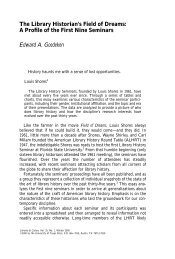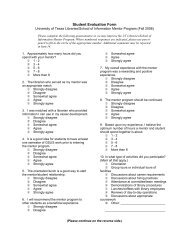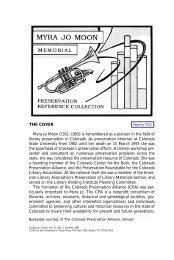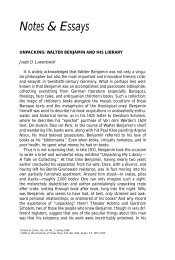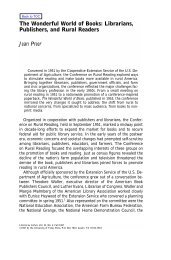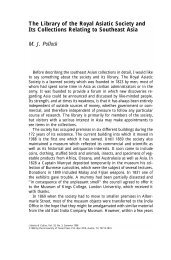Full issue (pdf file, 973 kb) - School of Information - The University of ...
Full issue (pdf file, 973 kb) - School of Information - The University of ...
Full issue (pdf file, 973 kb) - School of Information - The University of ...
Create successful ePaper yourself
Turn your PDF publications into a flip-book with our unique Google optimized e-Paper software.
iography <strong>of</strong> Charles C<strong>of</strong>fin Jewett and Emily Danton’s Pioneering Leaders<br />
in Librarianship have been published since 1947. 18 In 1975 Libraries<br />
Unlimited started a Heritage <strong>of</strong> Librarianship Series and in the next five<br />
years published rather positive biobibliographical volumes on Jewett,<br />
Ainsworth Rand Sp<strong>of</strong>ford, Charles Ammi Cutter, Melvil Dewey, and<br />
Justin Winsor. 19<br />
Biographies<br />
Two works published in 1963 established new standards for American<br />
library history biography: Ed Holley’s award-winning Charles Evans:<br />
American Bibliographer and Bill Williamson’s William Frederick Poole and the<br />
Modern Library Movement. 20 Both are grounded in research into primary<br />
source materials, both attempt to contextualize their protagonists in a<br />
larger pr<strong>of</strong>essional world, both identify and address their subject’s<br />
strengths and weaknesses. A worthy predecessor to Holley and<br />
Williamson is E. M. Fleming’s work on R. R. Bowker. 21 Worthy successors<br />
include Laurel Grotzinger’s favorable biography <strong>of</strong> Katharine Sharp,<br />
Peggy Sullivan’s admirable work on Carl Milam, Marion Casey’s excellent<br />
Charles McCarthy, John Richardson’s careful piece on Pierce Butler,<br />
and Lee Shiflett’s recently published work on Louis Shores. 22<br />
Perhaps no figure in American library history has drawn so much<br />
attention as Melvil Dewey, our pr<strong>of</strong>ession’s most enigmatic pioneer.<br />
Grosvenor Dawe’s authorized and highly reverential biography was published<br />
shortly after Dewey’s death in 1931. It was followed in 1944 by<br />
Fremont Rider’s brief work for the American Library Pioneer series. In<br />
1978 Sarah Vann did a very favorable sketch <strong>of</strong> Dewey in the Heritage <strong>of</strong><br />
Librarianship Series; in 1981 Forest Press hosted a seminar on Dewey<br />
and his classification, then later published the proceedings. <strong>The</strong> latest<br />
addition to Dewey biographical coverage is my own Irrepressible Reformer,<br />
which carefully examines Dewey in the context <strong>of</strong> his time, looks at the<br />
whole man (halos and warts, including his anti-Semitism and sexual<br />
harassment), and at the same time grounds a narrative <strong>of</strong> his fascinating<br />
past and the influential role he played in structuring the American<br />
library pr<strong>of</strong>ession in an analysis <strong>of</strong> scores <strong>of</strong> relevant archival collections<br />
across the country. 23<br />
Autobiographies<br />
American library history now has a creditable body <strong>of</strong> autobiographies.<br />
Charles Compton’s Memories <strong>of</strong> a Librarian is still worth a read. 24 Larry<br />
Powell’s Fortune and Friendship (and the sequel Life Goes On), Keyes<br />
Metcalf’s Random Recollections, Ralph Ellsworth’s Ellsworth on Ellsworth,<br />
9



